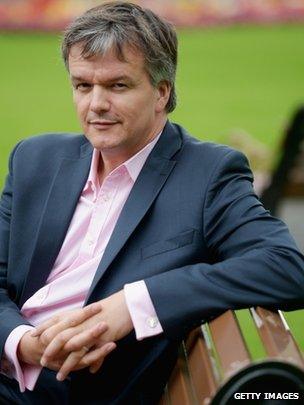Profile: Michael Moore
- Published

Michael Moore was appointed Scottish secretary in 2010
Michael Moore was born in Northern Ireland in 1965, where his father worked as a chaplain to The Army.
In 1970, he moved with his family to Wishaw in Lanarkshire, though he was educated at Strathallan School in Perth.
He completed his school education at Jedburgh Grammar after his family relocated to the Scottish Borders in 1981.
Mr Moore now lives in Galashiels with his wife Alison and his daughter Ella.
As a student at Edinburgh University, studying politics and modern history, he says he was inspired by the prominent Liberal Democrat politician, Sir David Steel, who was then a Scottish Borders MP.
Mr Moore said he was drawn to the Lib Dem Party based on his desire for a fairer political system, a better welfare system and greater human rights.
Opposition politician
After university he worked for a year as a researcher for Lib Dem MP Archy Kirkwood.
He then worked for Coopers & Lybrand in Edinburgh where he qualified as a Scottish chartered accountant.
In 1995, Mr Moore returned both to the Borders and to a job with the party, working for David Steel as a researcher.
Two years later his mentor retired and Mr Moore was elected as Lib Dem MP for Mr Steel's constituency of Tweeddale, Ettrick and Lauderdale (Berwickshire, Roxburgh & Selkirk from 2005 following boundary changes).
In opposition, Mr Moore focused on foreign policy, defence, international development and Scottish affairs.
In 2002, he was elected to the internal position of deputy leader of the Scottish Liberal Democrats and re-elected to the role in 2007.
He joined the Lib Dem front bench in 2005, and held many shadow portfolios, including defence, foreign affairs, international development and Northern Ireland and Scotland.
Mr Moore was elevated to Secretary of State for Scotland after the 2010 general election. Citing the pressures of an increased workload, he later quit his role as Lib Dem deputy leader.
Key roles
Since entering office, Mr Moore has overseen the implementation of the Scotland Act 2012, external, which grants further devolution to Scotland.
The coalition government said it represented the biggest transfer of fiscal power to Scotland in more than 300 years.
The SNP administration at Holyrood, which will hold a referendum on Scottish independence in September 2014, had backed the Scotland Bill, but said it had been "bypassed by events".
Mr Moore was also involved in negotiations leading to the Edinburgh Agreement, external, which handed the power to hold the referendum to the Scottish Parliament.
He was also part of discussions that saw funding being retained for two aircraft carriers to build at UK yards, including Glasgow and Rosyth.
And he provided backing to retain under-threat RAF bases in Kinloss and Lossiemouth. RAF Lossiemouth was spared and RAF stations at Kinloss and Leuchars were closed, but transferred to the Army.
'Horffic thing'
His name is also closely linked to tuition fees. In 2010, Mr Moore voted in favour increasing university tuition fees in England, while six of his Scottish Lib Dem colleagues rebelled or abstained.
Hours later, he was secretly recorded by the Daily telegraph expressing private concern over tuition fees.
He told Telegraph reporters, posing as constituents, that the increase in tuition fees were "the biggest, ugliest, most horrific thing in all of this... a car crash, a train wreck".
He added: "I signed a pledge that promised not to do this. I've just done the worst crime a politician can commit, the reason most folk distrust us as a breed. I've had to break a pledge and very, very publicly."
Having successfully steered the coalition government at Westminster through the Scotland Act 2012 and the Edinburgh Agreement, he is now to be replaced.
The party's chief whip, Alistair Carmichael MP, who is considered to have a more combative style, will lead take on the role of Scottish Secretary in the lead up to the referendum.
- Published7 October 2013
- Published7 October 2013
- Published7 October 2013
- Published7 October 2013